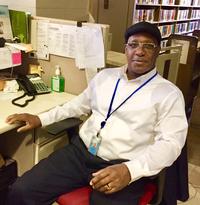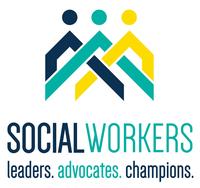Did you know the Free Library has trained mental health professionals on site at Parkway Central Library to help patrons who are in need of social services and other referrals? Because of all the great work being done, and in honor of National Social Work Month in March, we took a few moments to catch up with Michael Rabb, one of our onsite experts who has an MS in Health Administration and is a PhD candidate in Clinical Psychology. He spends three days a week working at the library via a partnership with CATCH (Citizens Acting Together Can Help) and the Department of Behavioral Health and Intellectual disAbility Services. Here’s an abridged write-up of our conversation:
What attracted you to the mental healthcare arena? How did you get interested in this field of study and work?
Helping people has always been of interest. Initially, I thought of being a lawyer, but as an undergrad at Auburn University, I took a community psychology course that shifted my thinking and led me to realize psychology would be a better avenue for fulfilling my passion to help others.
What’s rewarding about your work? Do you have a success story you’d like to share?
Helping people find solutions and supports is my calling. No matter what someone is struggling with, whether that be mental/behavioral health issues or homelessness, it’s always satisfying to help open doors to needed services. After my first year of graduate school, I decided to move back to Philadelphia (my birth place) to take on a job as a residential counselor (in what’s commonly known as a “group home”) with a mental health provider located in Kensington. The group home housed six to eight men who suffered with mental and behavioral health challenges. My first night on the job, one of the residents came down the stairs after midnight holding a knife. He said he was God and I was the devil, and that he was going to have to kill me. Having no related experience, I sprang into action with a sense of purpose toward keeping both the resident and myself safe. After what felt like hours, I was able to wrestle the knife away from him and get him to calm himself. We were both safe. After that, I felt more self-assured that I was indeed cut out for this kind of work because I knew I could handle crisis situations. Additionally, the resident (who was in an acute psychotic crisis), received needed mental health treatment at a nearby hospital, and there were major changes in the agency’s policy. The agency invested in training all staff in "Defusing Escalating Situations and Managing Aggressive Clients." I was asked to assist in the development and implementation of the training.
What’s difficult or trying about your work?
Often, social workers, nurses, and other health and human services experts are called upon to be advocacy consultants on many grassroots and political levels. Given the decline in funding seen over the past decade, we are challenged to find and provide more resources and supports to those in need. This can be frustrating, and it’s ever more difficult for the industry to hold onto good, passionate employees.
What does being a mental health expert at the Free Library look like? What are some of the typical activities of your work?
Initially, the scope of the library position was rather narrow, focusing primarily on referring those in need of homelessness or behavioral health services to local organizations. In reality, a lot of our work, which uses the expertise we’ve been trained for, deals with assessing and evaluating the “unique paths” of each of our patrons. We not only identify immediate (crisis- oriented) needs but look at their state of mind, behavioral health issues, and other contributing barriers that, when addressed, will serve to improve the patron’s circumstance and overall quality of life. After we make an assessment, we can then better understand how to refer people to resources that can provide help. Sometimes, those services are available in the library itself, like free computers and job resources. At first, we thought our work would be contained within Parkway Central, but it soon became clear that the neighborhood libraries are also in dire need of this level of support. We regularly field phone calls from staff all over the Free Library’s system. We also go to neighborhood libraries to consult with staff in resolving problems or to provide trainings. Occasionally, we conduct home visits as another vehicle of support to our patrons.
Did you go to the library as a kid?
Well, I was an English major as an undergraduate, so I spent a lot of time in libraries nurturing my love of writing and poetry. I grew up in West Philadelphia during a time when there were a lot of gangs, so the Haverford Library was the “safe haven” in my neighborhood.
What’s something you’d like readers to know about your profession?
The most important part about approaching or assessing someone who is struggling is to meet them where they are, from a place of non-judgement, and to seek empathy within oneself. It’s difficult not to assume that someone who is misbehaving is “bad,” but we don’t know their story—whether they’re homeless or have been abused or traumatized, recently displaced, or are dealing with some other problems (it doesn’t really matter what has happened). At the library, we all are stakeholders utilizing services. I always think to myself, Let me share with you the menu of services offered by the Social Workers. How can I help?
Are you in need of local social services or hoping to help someone who is? Check out Philadelphia’s comprehensive list of resources for both mental and physical health. Additionally, check out the Free Library’s community resource guide, Bridges, for additional information about library, community, job, and social services.
Have a question for Free Library staff? Please submit it to our Ask a Librarian page and receive a response within two business days.


